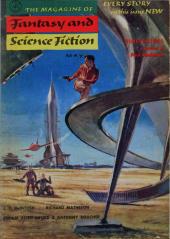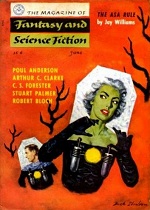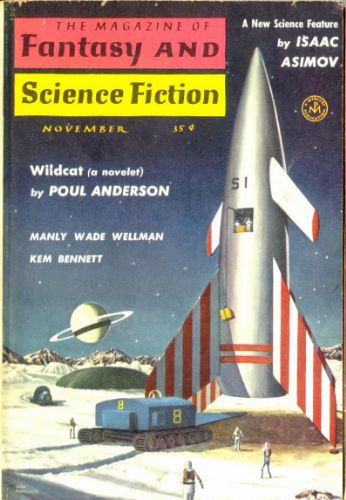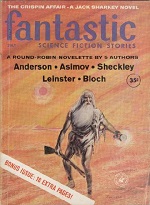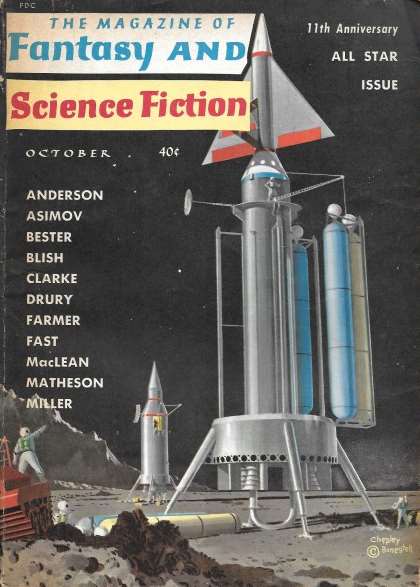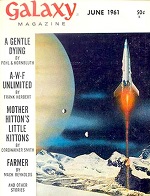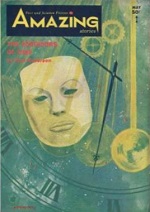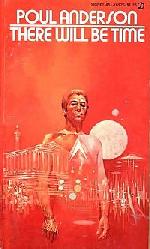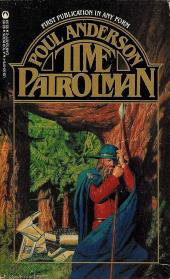Short Story
Poul Anderson
writer
- Filter: Show all works, including those with no time phenomena.
- Found: 34 results in 4.10ms
Short Story
Novella
Novelette
Novelette
Time Patrol
- by Poul Anderson
- Magazine of Fantasy and Science Fiction, May 1955
In the first of a long series of hallowed stories, former military engineer (and noncomformist) Manse Everard is recruited by the Time Patrol to prevent time travelers from making major changes to history. (Don’t worry, history bounces back from the small stuff.) —Michael Main
If you went back to, I would guess, 1946, and worked to prevent your parents’ marriage in 1947, you would still have existed in that year; you would not go out of existence just because you had influenced events. The same would apply even if you had only been in 1946 one microsecond before shooting the man who would otherwise have become your father.

Novelette
Delenda Est
- by Poul Anderson
- Magazine of Fantasy and Science Fiction, December 1955
Events are the result of a complex. There are no single causes. That’s why it’s so hard to change history. If I went back to, say, the Middle Ages, and shot one of FDR’s Dutch forebears, he’ll still be born in the late nineteenth century—because he and his genes resulted fom the entire world of his ancestors, and there’d have been compensation. But evey so often, a really key event does occur. Some one happening is a nexus of so many world lines that its outcome is decisive for the whole future.

Short Story
The Man Who Came Early
- by Poul Anderson
- Magazine of Fantasy and Science Fiction, June 1956
An explosion throws Sergeant Gerald Robbins from the 1950s to about 990 AD Iceland where, despite his advanced knowledge, he has trouble fitting in.
Now, then. There is one point on which I must set you right. The end of the world is not coming in two years. This I know.

Short Story
Short Story
Wildcat
- by Poul Anderson
- Magazine of Fantasy and Science Fiction, November 1958
Herries, the leader of 500 men drilling for oil in the Jurassic, wonders about free will and the eventual fate of twentieth century America and its nuclear-armed adversaries.
The story was a nice forerunner to Silverberg’s “Hawksbill Station.”
The story was a nice forerunner to Silverberg’s “Hawksbill Station.”
But we are mortal men. And we have free will. The fixed-time concept need not, logically, produce fatalism; after all, Herries, man’s will is itself one of the links in teh causal chain. I suspect that this irrational fatalism is an important reason why twentieth-century civilization is approaching suicide. If we think we know our future is unchangeable, if our every action is foreordained, if we are doomed already, what’s the use of trying? Why go through all the pain of thought, of seeking an answer and struggling to make others accept it? But if we really believed in ourselves, we woiuld look for a solution, and find one.

Novelette
Brave to Be a King
- by Poul Anderson
- Magazine of Fantasy and Science Fiction, August 1959
Patrolman Keith Denison uses some sketchy tactics (sketchy to the Patrol, that is) to track down his partner Keith Denison, who’s disappeared in the time of the Persian King Cyrus the Great, —Michael Main
In the case of a missing man, you were not required to search for him just because a record somewhere said you had done so. But how else would you stand a chance of finding him? You might possibly go back and thereby change events so that you did find him after all—in which case the report you filed would “always” have recorded your success, and you alone would know the “former” truth.

Novelette
The Only Game in Town
- by Poul Anderson
- Magazine of Fantasy and Science Fiction, January 1960
While on a two-man mission to stop a Mongol party from exploring North America in AD 1280, Patrolman John Sandoval gets a cracked skull, which leaves Manse Everard to figure out a way to save John and the mission while waxing philosophical about time travel and the Time Patrol. —Michael Main
Thin lightnings winked from above. The cloven air boomed behind them. He felt a chill, deeper than the night cold. But he eased his pace. There was no more reason for hurry.

Novelette
The Only Game in Town
- by Poul Anderson
- Magazine of Fantasy and Science Fiction, January 1960
While on a two-man mission to stop a Mongol party from exploring North America in AD 1280, Patrolman John Sandoval gets a cracked skull, which leaves Manse Everard to figure out a way to save John and the mission while waxing philosophical about time travel and the Time Patrol. —Michael Main
Thin lightnings winked from above. The cloven air boomed behind them. He felt a chill, deeper than the night cold. But he eased his pace. There was no more reason for hurry.

Short Story
The Covenant
- by Poul Anderson
- Fantastic July 1960
Captain Ban, son of the Warden, is told by an oracle that he alone must fly to the island stronghold of those masters of time, the Cloud-People.
Your world is a slope and you roll down it all the time. Down and down until you wear out and die.

Short Story
Welcome
- by Poul Anderson
- Magazine of Fantasy and Science Fiction, October 1960
Tom Barlow, the world’s first time traveler, receives a welcome from Earth’s rulers 500 years in the future.
Tom departed from the late twentieth century because of its unpleasant political climate, but the description of Barlow’s orginal time reads more as if Anderson got a peek at 2016 Donald Trump.
Tom departed from the late twentieth century because of its unpleasant political climate, but the description of Barlow’s orginal time reads more as if Anderson got a peek at 2016 Donald Trump.
Disgust would be the simplest word.

Short Story
My Object All Sublime
- by Poul Anderson
- in Galaxy, June 1961
A man becomes fast friends with a real estate entrepreneur who, one night, tells him a fantastic story of time-travelers in the far future who use the past as a criminal dumping ground.
The homesickeness, though, that’s what eats you. Little things you never noticed. Some particular food, the way people walk, the games played, the small-talk topics. Even the constellations. They're different in the future. The sun has traveled that far in its galactic orbit.

Novel
The Corridors of Time
- by Poul Anderson
- in Amazing, May-Jun 1965
While awaiting trial for a self-defense killing, young Malcolm Lockridge is approached by a wealthy beauty, Storm Darroway, who offers to defend him in return for him joining her in what he eventually finds out are Wars in Time between the naturalist Wardens and the technocrat Rangers.
For many years, I thought this novel was part of Poul’s Time Patrol series, until Bob Hasse mentioned this as one of his favorites that is not in the series. The beginning reminded me of Heinlein’s Glory Road, and the rest is reminiscent of Asimov’s The End of Eternity, both of which captivated me in the summer of 1968. Poul’s book holds up well in that company.
For many years, I thought this novel was part of Poul’s Time Patrol series, until Bob Hasse mentioned this as one of his favorites that is not in the series. The beginning reminded me of Heinlein’s Glory Road, and the rest is reminiscent of Asimov’s The End of Eternity, both of which captivated me in the summer of 1968. Poul’s book holds up well in that company.
A series of parallel black lines, several inches apart, extended from it, some distance across the corridor floor. At the head of each was a brief inscription, in no alphabet he could recognize. But every ten feet or so a number was added. He saw 4950, 4951, 4952. . .

Novella
Short Story
Short Story
Kyrie
- by Poul Anderson
- in The Farthest Reaches, edited by Joseph Elder (Trident Press, September 1968)
Novel
Novel
The Dancer from Atlantis
- by Poul Anderson
- (Nelson Doubleday, August 1971)
On a romantic cruise with his wife and his troubled marriage, forty-year-old Duncan Reid is snatched from the deck by a vortex and deposited around 4000 B.C., where he meets three others who were similarly taken: the Russian Oleg, the Goth Uldin, and the beautiful bull-breeder Erissa who remembers the gods of her time, remembers Atlantis, and remembers Duncan fathering her child.
She was lean, though full enough in hips and firm breasts to please any man, and long-limbed, swan-necked, head proudly held. That head was dolichocephalic but wide across brow and cheeks, tapering toward the chin, with, a classically straight nose and a full and mobile mouth which was a touch too big for conventional beauty. Arching brows and sooty lashes framed large bright eyes whose hazel shifted momentarily from leaf-green to storm-gray. Her black hair, thick and wavy, fell past her shoulders; a white streak ran back from the forehead. Except for suntan, a dusting of freckles, a few fine wrinkles and crow’s-feet, a beginning dryness, her skin was clear and fair. He guessed her age as about equal to his.

Novel
There Will Be Time
- by Poul Anderson
- (Nelson Doubleday, September 1972)
The doctor and confidant of Jack Havig relates Jack’s life story from the time the infant started disappearing and reappearing to the extended firefight through time with the few other time travelers that Havig encountered.
No, no, no. I suppose it’s simply a logical impossibility to change the past, same as it’s logically impossible for a uniformly colored spot to be both red and green.

Novelette
The Little Monster
- by Poul Anderson
- in Science Fiction Adventure from Way Out, edited by Roger Elwood (Whitman, 1973)
Short Story
Gibraltar Falls
- by Poul Anderson
- in The Magazine of Fantasy and Science Fiction, October 1975
As part of an crew assigned to crew to observe the filling of the Mediterranean from the Atlantic in the late Micene, Patrolman Tom Nomura breaks the rules to use time travel to rescue Feliz a Rach when she’s swept over the falls. —Michael Main
The Mediterranean floor lay ten thousand feet below sea level. The inflow took most of that drop within a fifty-mile strait. Its volume amounted to ten thousand cubic miles a year, a hundred Victoria Falls or a thousand Niagaras.

Novelette
Dialogue
- by Poul Anderson
- in Faster than Light, edited by Jack Dann and George Zebrowski (Harper and Row, 1976)
Short Story
Joelle
- by Poul Anderson
- in Asimov’s Science Fiction, Fall 1977
Canadian Eric Stranathan is one of the few people in the world who can merge his mind with computer hardware, taking him to mental vistas beyond that of mere humans. At a conference to explore the possibilities of the technology, he meets the beautiful American Joelle who shares his ability. The two fall deeply in love, but because of security restrictions, it’s fifteen months before she can show him the capabilities of her mind-machine connection.
The time-travel connection is slight in this long story, but it is relevant to Joelle. As I read though, I wondered whether the story could have been much more had the time-travel element been taken more to heart.
The time-travel connection is slight in this long story, but it is relevant to Joelle. As I read though, I wondered whether the story could have been much more had the time-travel element been taken more to heart.
He swept out of the cell, through space and through time, at light-speed across unseen prairies, into the storms that raged down a great particle accelerator.

Novel
The Avatar
- by Poul Anderson
- (Berkley Putnam, October 1978)
No, this book has nothing to do with Cameron’s more widely-known movie, although critics have noted a similarity between the movie and an earlier Anderson story, “Call Me Joe.” As for The Avatar, it’s a political story of time-space portals (Tipler cylinders known in the book as T-machines) left behind by the “Others.” Wealthy Daniel Broderson wants to use results of a portal exploration team for the benefit of all mankind, while the authoritarian leaders of Earth thinks that mankind isn’t ready for the full truth.
The title avatar of Anderson’s book is present as one of the portal exploration team members right from the start of the goings-on, but the name avatar isn’t used until the conclusion of the book—and the meaning of the word is the one that predates our modern digital view.
The title avatar of Anderson’s book is present as one of the portal exploration team members right from the start of the goings-on, but the name avatar isn’t used until the conclusion of the book—and the meaning of the word is the one that predates our modern digital view.
For us, approximately eight Terrestrial years have passed. It turns out that the T-machine is indeed a time machine of sorts, as well as a space transporter. The Betans—the beings whom we followed—calculated our course to bring us out near the date when we left.

Novella
Ivory, and Apes, and Peacocks
- by Poul Anderson
- in Time Patrolman (Tor, October 1983)
Everard Manse appears to be the sole Patrolman standing between the evil Exaltationists and the fall of ancient Tyre—or possibly the fall of all civilization. Ah, but wait! The loyal street urchin Pum will also stand by his side! —Michael Main
If Tyre explodes, why, here we’ll be, but our ancestors, your kids, everything we knew, they won’t. It’ll be a whole different history. Whether whatever is left of the Patrol can restore it—somehow head off the disaster—that’s problematical. I’d call it unlikely.

Novella
The Sorrow of Odin the Goth
- by Poul Anderson
- in Time Patrolman (Tor, October 1983)
Patrolman Carl Farnass is more of a story-gatherer and histornian than a time cop, and unlike most patrolmen, he takes a wife in the time of the Goths and takes a godlike interest in his children and their descendants. —Michael Main
But I did not, repeat not establish a new god; I merely fitted an image they’d long worshipped, and in the course of time, a generation or so, they came to assume I must be him.

Short Story
Statesmen
- by Poul Anderson
- in Time Gate, edited by Bill Fawcett and Robert Silverberg (Baen Books, December 1989)
Novel
Novella
Novelette
Death and the Knight
- by Poul Anderson
- in Tales of the Knights Templar, edited by Katherine Kurtz (Aspect, June 1995)
Novelette

